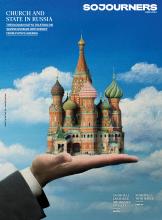PREACHER ACTIVIST AND drag queen Marge Erin Johnson walked up to the wooden lectern at Fort Washington Collegiate Church in Manhattan wearing a sequin rainbow dress and high hot pink wig. “I want to give an extravagant welcome to the LGBTQIA+ community,” she said, “especially those of us that have been burned by the demonic homophobic and transphobic flames of the church. You are welcome here. And lastly, a special welcome to those who are here today — whether you are queer or straight — but for some reason, you feel more seen and comfortable and heard because there is a drag queen at the pulpit.”
Marge Erin Johnson is the drag persona of James Admans (they/them), a nonbinary minister, currently ordained, pending call, in the United Church of Christ. A graduate of Union Theological Seminary, Admans served as assistant minister at Fort Washington Collegiate Church where they coordinated an LGBTQ+ ministry called Beyond Labels, and edited the 2022 anthology Beyond Worship: Meditations on Queer Worship, Liturgy, and Theology. They are most well-known, however, for hosting drag church services where LGBTQ+ individuals can feel affirmed and welcomed back into spaces that may have caused immense trauma.
Marge told Sojourners that drag church “might be exactly what we need to remind us of the beauty and diversity and God’s infinite love for all.” But her ministry comes at a time when drag culture itself is under fire from U.S. conservatives. According to the ACLU, there are 319 anti-LGBTQ+ bills under deliberation or passed into law in the United States. These include legislation that would censor books with queer characters or ban trans youth from sports, and several anti-drag bills that could make performing drag to younger audiences illegal. These bills, often used to create moral panic by associating trans people and drag queens with sexual endangerment of children, are in large part created and supported by Christians.
Read the Full Article

